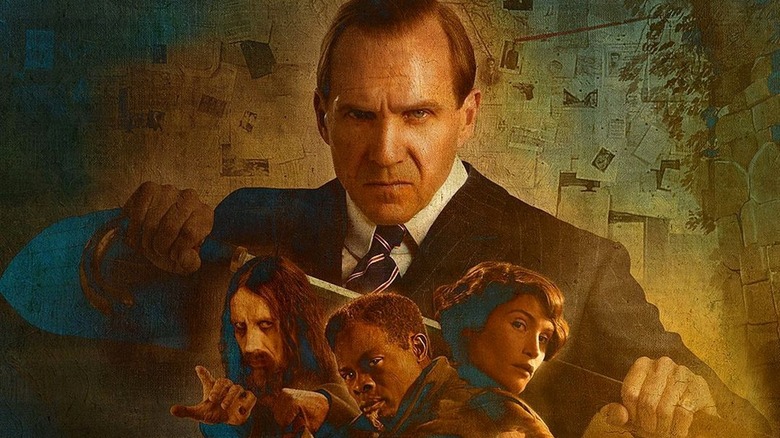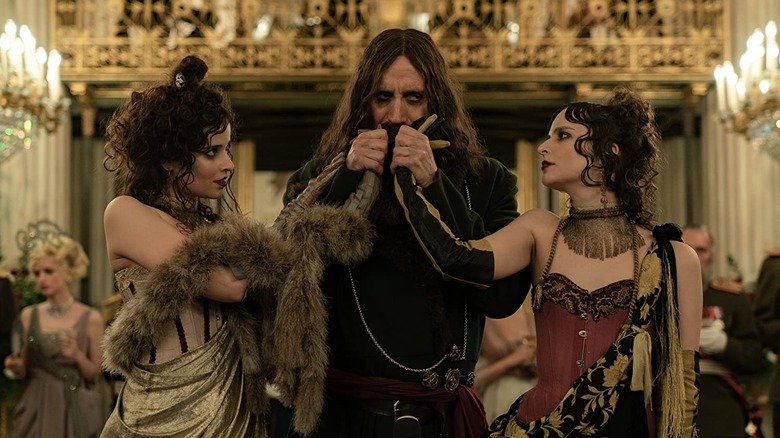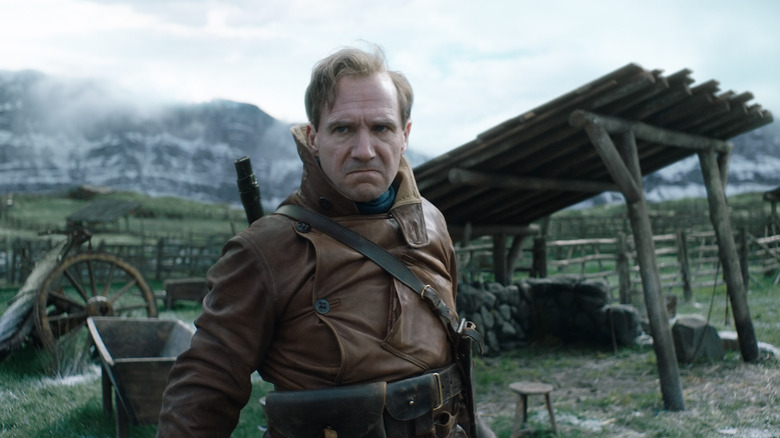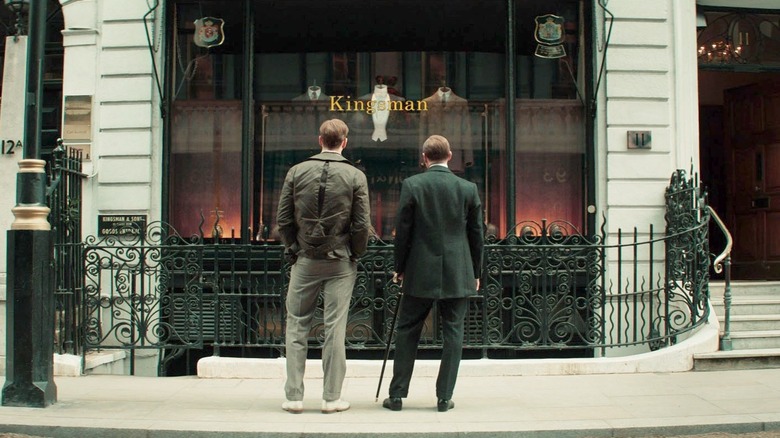The King's Man Ending Explained: The Gentlemen Of Wartime
After what feels like forever, director Matthew Vaughn's "The King's Man" has finally arrived in theaters. Serving as a prequel to the events of both "Kingsman: The Secret Service" and "Kingsman: The Golden Circle," Vaughn decided to take us back to the early 1900s for a World War I film that tells the origins of the secret agency.
"The King's Man" was delayed several times by the pandemic, but now it has arrived and there is much to discuss. Let's talk about the movie's ending and how it sets the stage for the franchise as we know it.
Warning: spoilers ahead for "The King's Man." Proceed with caution.
A Brief Recap
"The King's Man" largely focuses on Orlando, aka The Duke of Oxford (Ralph Fiennes), and his efforts to help covertly win the war while avoiding any actual conflict (he made a promise to his late wife, who dies early on in the movie). That is also why his son, Conrad (Harris Dickinson), is prevented from going to war until much later in the movie, when it is fully out of the Duke's control.
The Duke and his son, along with trusty employees Polly (Gemma Arterton) and Shola (Djimon Hounsou), manage to assemble a network of servants in high places to help thwart the efforts of a mysterious shadow organization, led by a mysterious individual who is pulling the strings behind the scenes. This individual even incites World War I by ordering the assassination of Archduke Franz Ferdinand (Ron Cook). This is a big theme throughout "The King's Man," as Vaughn used real events to inspire his tale of how the Kingsman came to be.
Ultimately, Kingsman are able to thwart Rasputin (Rhys Ifans), but not before he heals the Duke's legs in one of the most bizarre scenes you're likely to ever see in a mainstream Hollywood blockbuster. But this coincides with Conrad's birthday and, following Rasputin's death, he enlists in the war effort without his father's blessing. This is the pivotal moment in the movie.
Conrad got an assist from King George V (Tom Hollander), who offered to help keep him out of combat following the decoding of the secret message that would surely help get the U.S. into the war effort and thwart the whole thing altogether. But Conrad isn't having it, and swaps places with a soldier named Archie Reid (Aaron Taylor-Johnson), who ends up returning back to the Duke's estate in Conrad's stead.
Pretending to be Archie, Conrad is sent on a dangerous assignment to recover intel from the battlefield. Following a harrowing knife fight, and a night spent in no man's land, Conrad attempts to save the spy who was carrying the intel in question, but had his leg blown off in battle. Conrad makes a harrowing dash across the battlefield back to the trenches, carrying the fallen spy. Unfortunately, a bomb goes off, killing the already wounded man. It is then discovered that Conrad is not who he says he is and, in the confusion, a friend of Archie's shoots him square in the head. Conrad dies and, quite honestly, it's pretty surprising how firmly the movie commits to it. He's truly dead.
A Father Enters the War
As one would expect, the Duke takes his son's death pretty hard and initially copes by drinking bottle after bottle of scotch. He doesn't care about the war effort any more and is in a depression that nobody would wish for any decent man. He broke his vow to abstain from violence, and broke the promise he made to his dying wife to protect their son. It's brutal. But from that pain emerges the motivation to press on and do something bigger than himself and his sorrows, with the help of a speech (and unexpected smooch) from Polly.
President Wilson won't bring America to war, as someone associated with the mysterious, nefarious organization has incriminating tape of the president with another woman. If that camera negative can be retrieved, Wilson will indeed go to war, effectively ending this plot to destroy England. So, the Duke suits up with Polly and Shola, heading to the mountaintop hideout where this shadow organization has been operating to do some real "Kingsman" business and save the world.
During this battle, we learn that Morton (Matthew Goode), who was seen as an ally to England early in the movie, faked his own death and was behind all of this. Rasputin and the rest of his evil followers, including Erik Jan Hanussen (Daniel Bruhl), and Mata Hari (Valerie Pachner). Morton, being Scottish, was motivated by his love for his country and was trying to go about liberating it in a pretty intense way.
The Duke and Morton have a very Vaughn-esque battle to the death and, with the help of when one of the sheep that Morton had been a dick to earlier, he is defeated and the world is saved. Shola, Polly, and Orlando get the camera negative to Wilson, who promptly burns it, and then goes to war. This overwhelms the opposition and all is well ... Ish. The world still suffered a great war and millions died, but it could have been worse if Morton had gotten his way.
The Founding of Kingsman
A huge theme throughout "The King's Man" is Orlando's pacifism and his efforts to avoid the loss of life. For the Duke of Oxford, his spy network was all about keeping peace and avoiding conflict. That is why killing Rasputin was worth breaking his vow, since that one death would save countless lives. So, when Orlando finally managed to topple the grand plan behind the scenes and help in a big way to end the war, it paved the way to expand the scope of that idea, and build upon what he, Polly and Shola had been doing all along.
The Duke invites King George V to Kingsman, a place we visited a few times throughout the movie as merely a high-end tailor shop. When we arrive there for the final time, we see that the upstairs room has been converted into a meeting room (much like the one we've seen in the other "Kingsman" movies) by Orlando, who purchased the shop to serve as a cover for his newly founded independent intelligence agency.
Around the table, we see Polly, Archie, the United States ambassador (Stanley Tucci), King George V, and Shola. Orlando then explains what the group's goal will be, in that they will operate in the shadows and away from politicians in an attempt to intervene and prevent catastrophes before they happen. Circling back to the Arthurian legend that was referenced earlier in the movie, everyone at the table is given a card: Polly is Galahad, Archie is Lancelot, the U.S. Ambassador is Bedevere (clearly paving the way for the eventual Statesman agency that we learn of in "The Golden Circle"), George is Percival, and Shola is Merlin. This is important, as it's a nod to the eventual position Mark Strong takes as Merlin in the franchise.
Thus, the Kingsman organization is born, starting the journey towards Harry and Eggsy's adventures in the first two "Kingsman" films. But the important takeaway from "The King's Man" is that the agency was born out of a drive to prevent loss of life through non-violent means. The whole "manners maketh man" thing truly makes sense, in that violence should only ever be a last resort.
The ending of "The King's Man" also leaves the door open for more adventures set in the past, particularly since the seeds of World War II began to be sown in the immediate aftermath of World War I. Not to make light of a dark time in world history, but Vaughn is clearly leaving the door wide open for more ... And the movie's post-credits scene has even more to say about that.
"The King's Man" is in theaters now.



